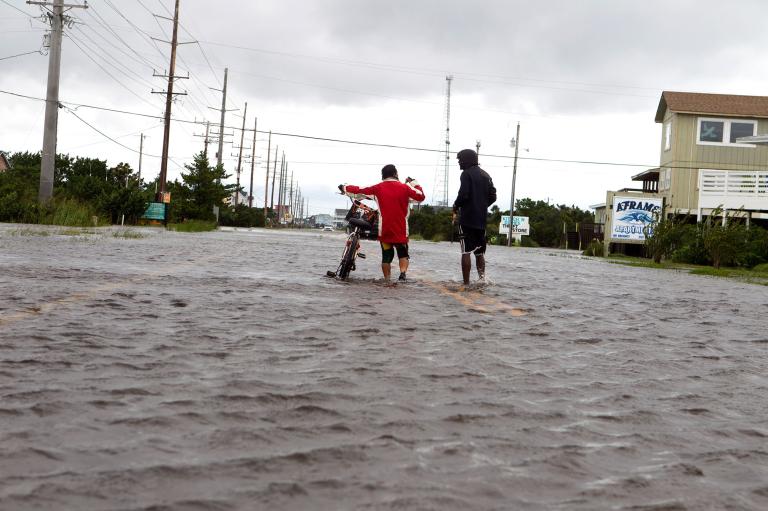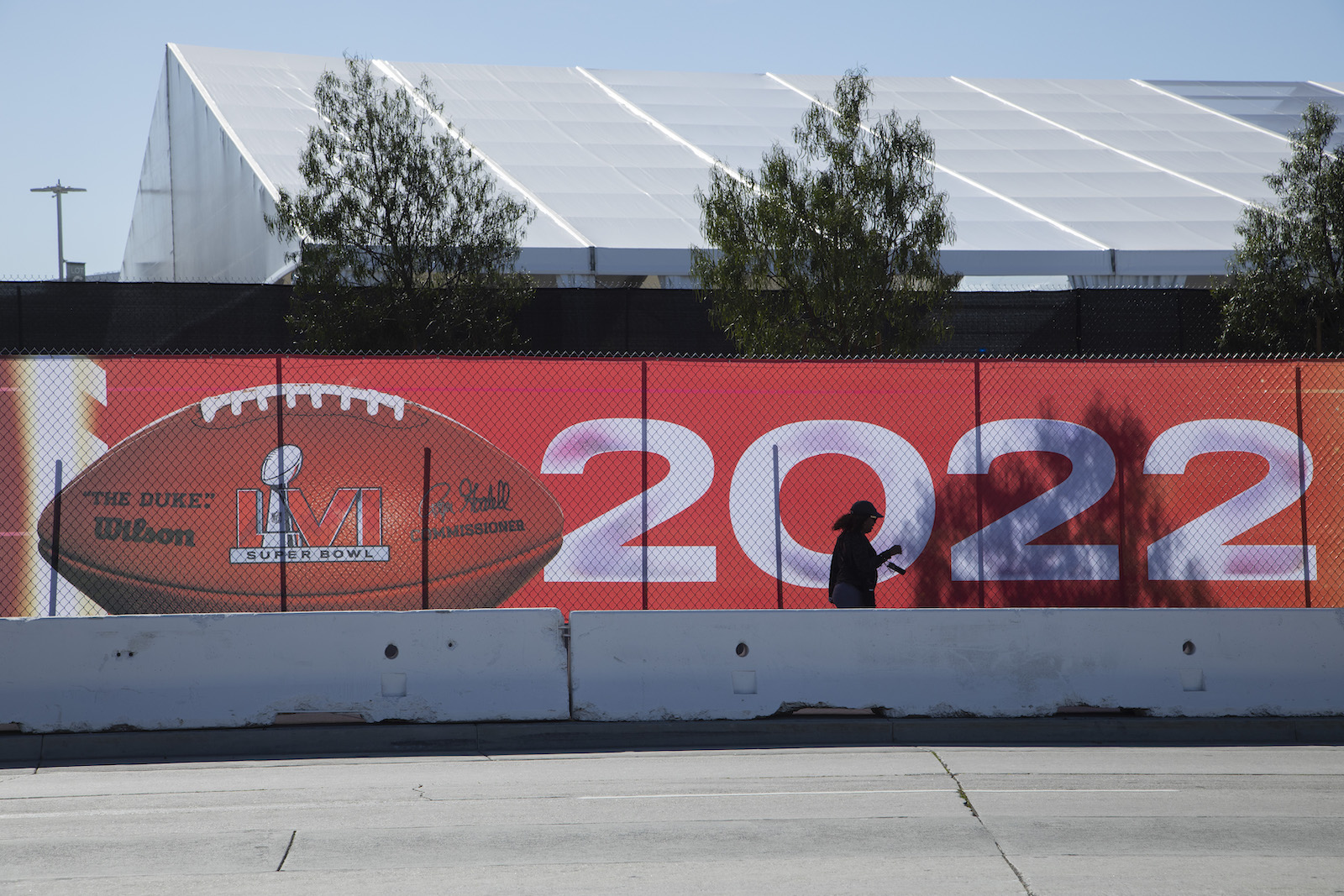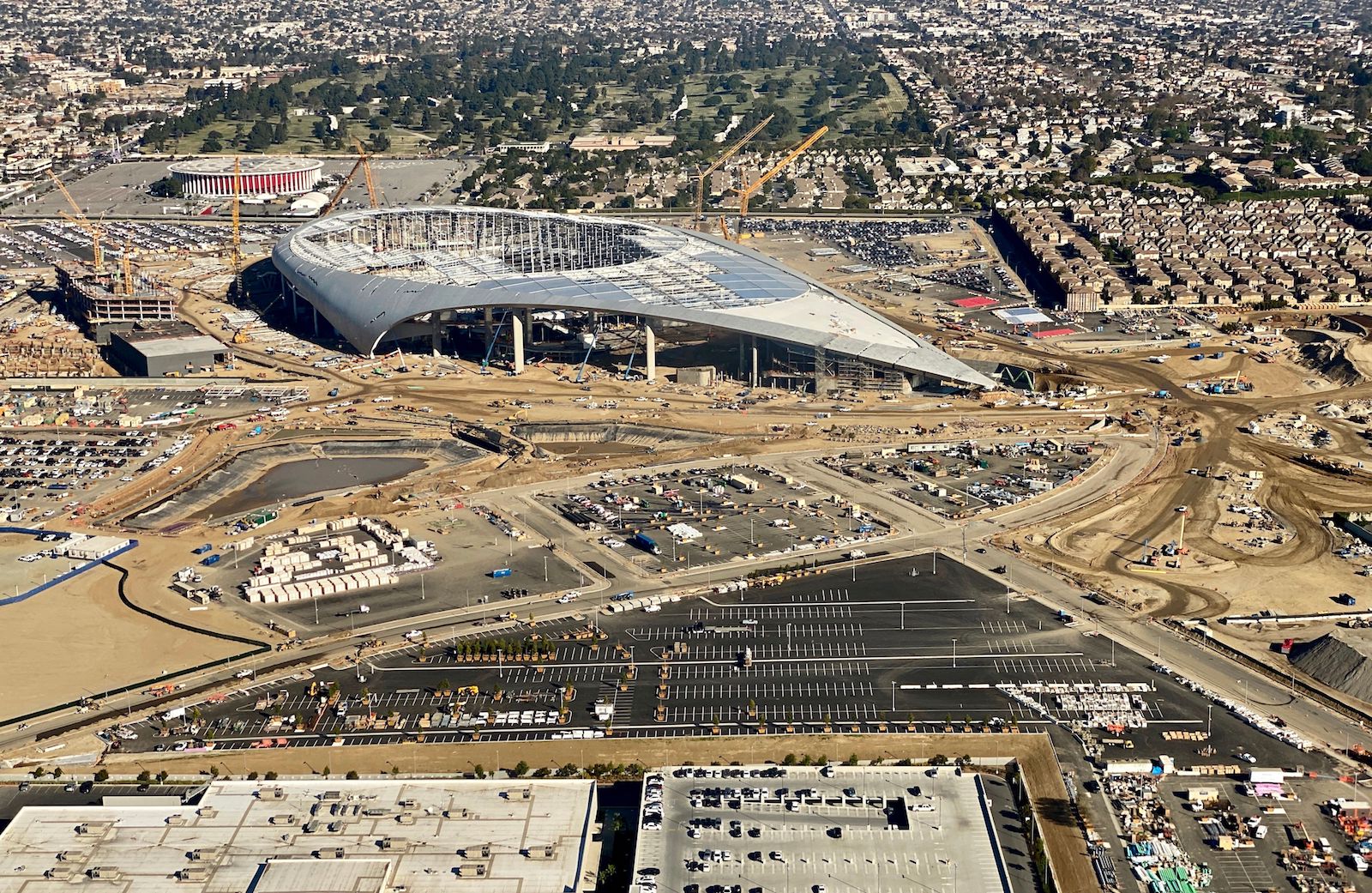In 2019, billionaire E. Stanley Kroenke, whose company owns the recently-constructed SoFi Stadium in the Southern California city of Inglewood, proudly boasted that without the stadium the city would remain “devoid of hope with no aspiration for the future.” For residents like 57-year-old Dawn Toftee, however, the stadium has only made life in Inglewood more difficult.
Toftee, who has lived in a tent outside of SoFi Stadium for two years, was one of roughly a dozen unhoused residents whose homes were forcibly removed by California’s state transit police on January 24, according to reporting by the Guardian. A representative from the transit agency CalTrans alleged that their camp presented a “safety issue” for the tens of thousands of tourists set to touch down in Inglewood for the Super Bowl this weekend — and their removal offered the city a chance to clean up its public spaces. CalTrans could not confirm whether anyone displaced received housing, shelter, or other services, according to the Guardian.
Inglewood isn’t doing anything radically different from other cities that have hosted marquee sporting events: Hundreds of unhoused people were “swept” from the streets during the 1984 Olympic Games in Los Angeles, and in the week before the 2019 Super Bowl in Atlanta, Georgia, dozens of unhoused residents were arrested and detained in county jail for “violating a city ordinance that requires sidewalks to be kept clean.”
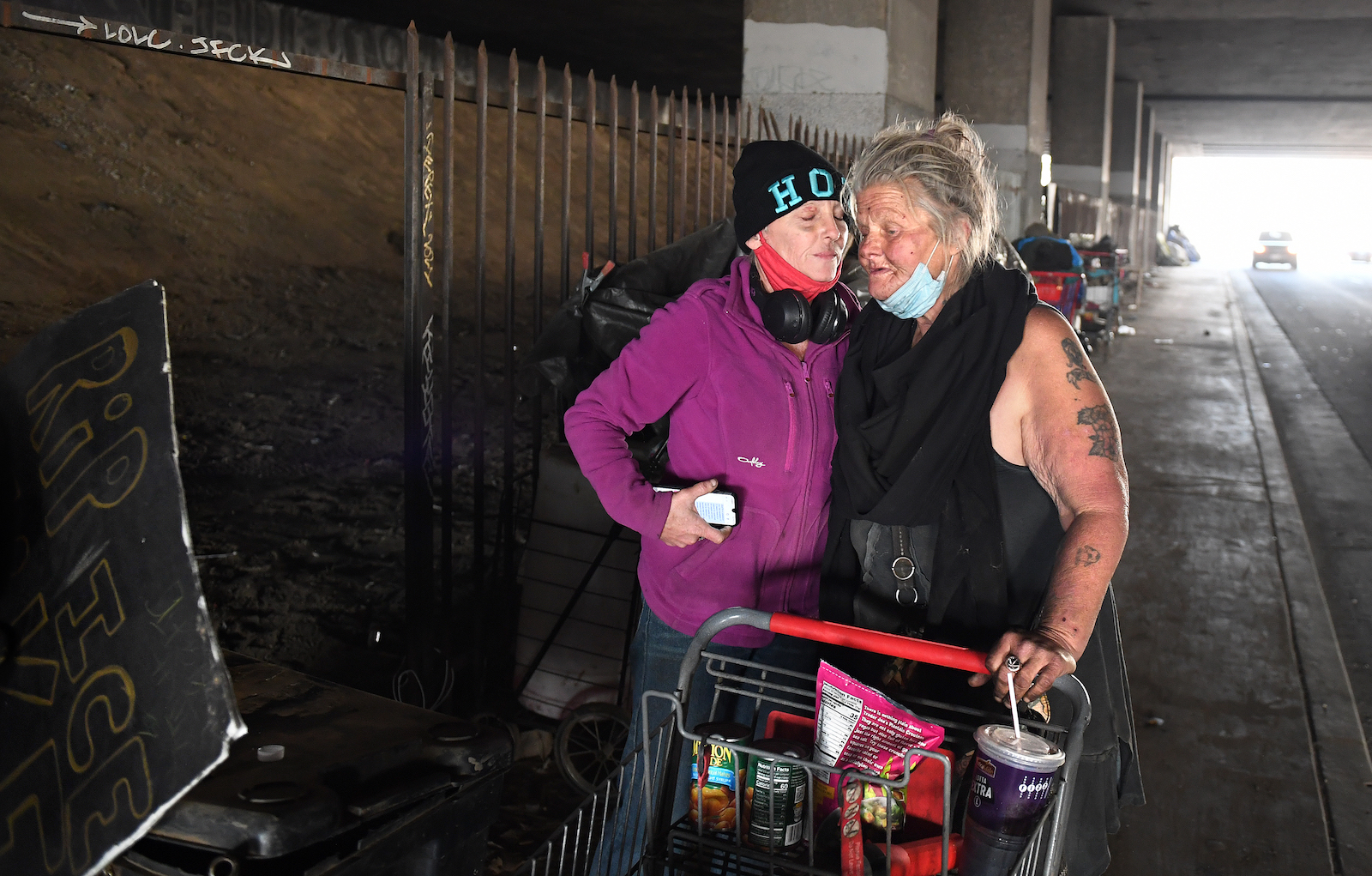
But in the South Los Angeles community dubbed the “City of Champions,” which is majority Black and Latino, residents are fighting back. Community members and activist groups, including the Lennox-Inglewood Tenants Union and a coalition of organizations attempting to block the city’s hosting of the 2028 Olympics, have accused the city and the National Football League, or NFL, of “greenwashing” — using deceptive marketing to convince the public that their policies are environmentally-friendly, sustainable, and community-oriented.
While some environmental and social programs, such as tree-planting initiatives and grants for small businesses, have been implemented because of the game, residents claim they’re being locked out of the small improvements the city is making. The programs, opponents say, are either focused in entirely different communities than the one directly surrounding SoFi Stadium or have become unattainable in a city under siege by tourists due to weekly sporting events and concerts at SoFi and the neighboring Forum Arena.
Some of those impediments can be traced to Inglewood’s municipal government. In early January, the city worked to develop a “clean zone” that would be enforced the week before and after the game. The 1-mile buffer around the stadium includes the city’s major shopping hub and thousands of households. It has already been used to justify banning encampments and is set to restrict the activities and movement of thousands of city residents, who will be subject to increased policing from three local police departments and a handful of federal bodies including the Federal Bureau of Investigation, Secret Service, Department of Defense, and Customs and Border Protection.
The buffer zone will help “protect the public health and safety” of people attending the “official events,” per a city document. According to the document and a January city council meeting, officials have cited the buffer zone as a way to cut down on litter by limiting the amount of people allowed within the area and also to better control traffic. In tandem with the clean zone, the NFL, which recently established its media headquarters in Inglewood, has funded a tree-planting project and community garden initiative to “reduce the environmental impact” of the Super Bowl and “leave a positive ‘green’ legacy” in the aftermath of the games.
Community organizer and local school board member Estefany Castañeda is not impressed. She says the city’s programs, while great on paper, are just a ploy for local leaders “to feel better about destroying” her hometown’s built and natural environment. While the increase of leafy greenery in communities has been linked to reduced air pollution, she believes that any gains from these improvements are being wiped away by the increased noise and air pollution caused by an influx of thousands of people into the city nearly every weekend for sporting events and concerts.
According to the NFL’s press office, just 60 trees have been planted in Inglewood parks. On average, 60 young trees can suck up roughly 800 pounds of carbon dioxide in a year, which dwarfs in comparison to the more than 3 million pounds of the greenhouse gas released on average during Super Bowl events — not to mention a full season of football games.
Oddly enough, many of the NFL’s tree-planting and community garden initiatives have not taken place in Inglewood, but rather in distant parts of the greater Los Angeles area. One event in particular, the “NFL Green Huddle” program, was touted as an initiative to “create better food security for local families” by building a community garden. The only problem: The garden will be located not in Inglewood but in the city of Los Angeles itself, more than 9 miles away from SoFi Stadium and a one-hour ride on public transit.
Representatives from the NFL and the city of Inglewood’s press office did not respond to Grist’s request for comment in time for publication.
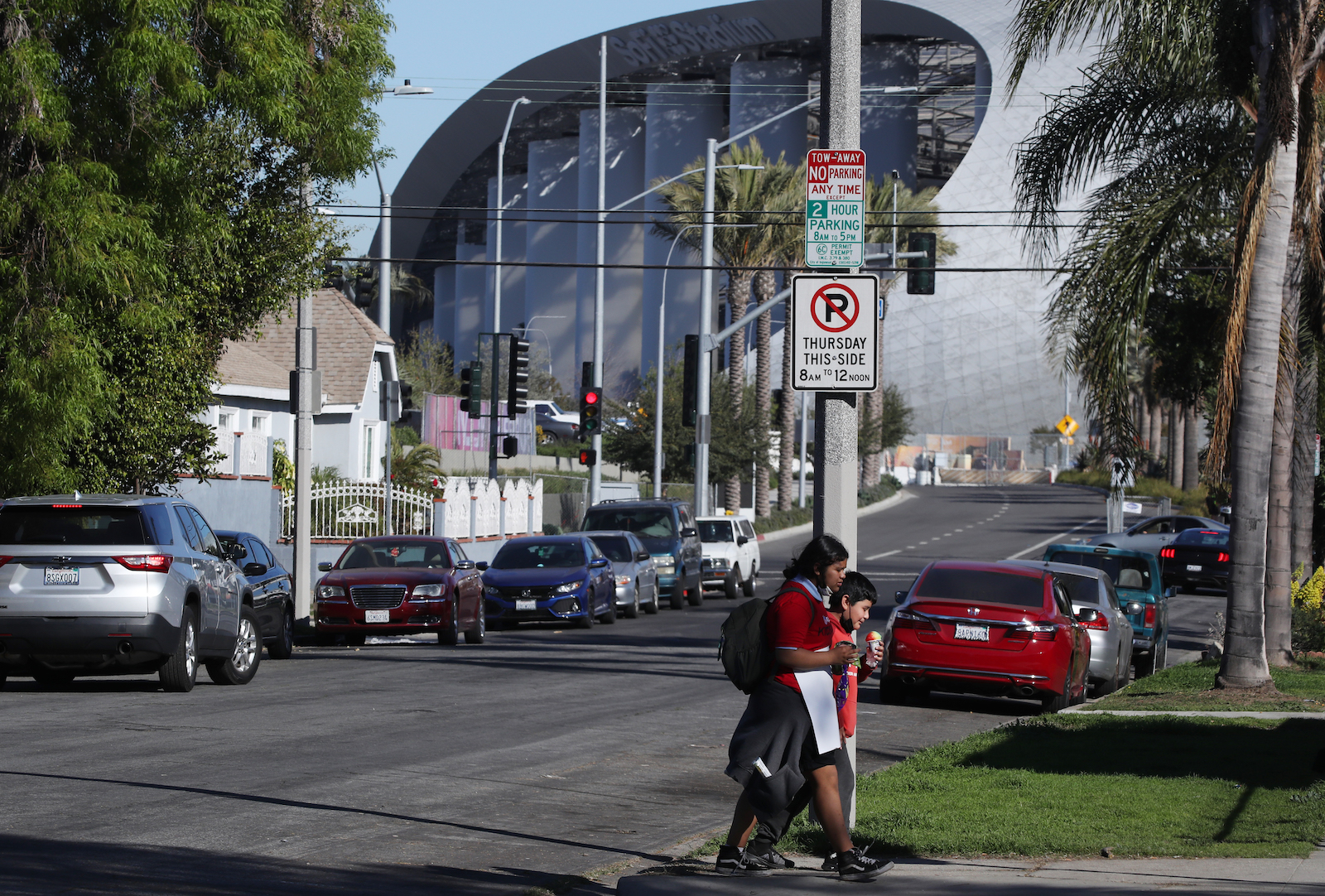
The opening of SoFi Stadium has brought an estimated half a million more cars through the neighborhood every month, burdened the area’s public transit system, and been cited to justify a $1.7 billion expansion project at Los Angeles’ airport. Even before the facility was constructed, the community living directly around SoFi Stadium was listed as being exposed to more environmental burdens than 96 percent of the state, according to the California Office of Environmental Health Hazard Assessment’s database.
“We shouldn’t have this conversation in the city of L.A., [which is] spending a fortune to make a fortune on the Super Bowl and the upcoming Olympics,” Johnnie Raines, a Los Angeles resident of 66 years, told LAist about the transformation of Inglewood at the expense of longtime residents. “If we got money to do that, why not more money for people?”
The struggle over the Super Bowl, housing, and environmental justice in Inglewood has set the stage for a conflict over the 2028 Olympics. “We are already accustomed to environmental racism and all the added issues of being a poor community,” Castañeda, the community organizer and local school board member, told Grist. “We’re sandwiched by three freeways, and our cars and homes are always caked with yellow powder from the airport down the street.”
“With that kind of normalcy towards those hazards,” she added, “billionaires and our local officials were like, ‘yeah, we can add more pollution and tear up this community and it’ll be fine.”
One apartment complex especially exemplifies the city’s transformation since SoFi’s construction right across the street. The complex was once known as “Inglewood Gardens,” but in the years since SoFi’s construction began it has been sold to new developers and rebranded as “Stadium View.” Studio apartments in the complex, which at one point housed Section 8 public housing residents, according to the Lennox-Inglewood Tenants Union, now go for $1600 per month. In 2016, the average studio apartment in Inglewood was $850 per month.
Between the start of SoFi stadium’s construction in 2016 and when it opened in 2020 — before the pandemic further exacerbated housing and homelessness issues in Los Angeles County — Inglewood’s housing prices rose more than 60 percent, while the city’s homeless population grew by at least 55 percent. Living on the streets is even more difficult in a place like Inglewood, which is defined by its air and noise pollution and is home to the fourth-busiest airport in the world, the second-largest oil field in the county, and two of the busiest freeways in the country.
Castañeda admits that moving this year’s Super Bowl game from Inglewood wouldn’t magically improve the lived experiences of the city’s residents, but she says that it would show that the city cares about tourists and residents equally.
As of February 3, the average price paid for Super Bowl tickets was $10,500 – 40 percent of what the average Inglewood resident makes in an entire year.
“If you have so much of your population that’s in a state of barely surviving,” Castañeda said, “how can you justify completely exploiting the land and our working-class community’s resources and access to the environment around us?”
